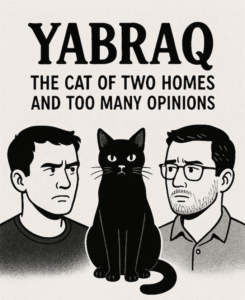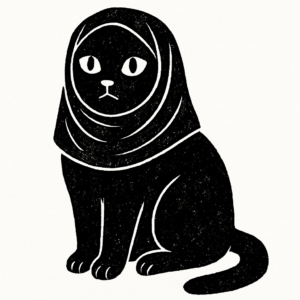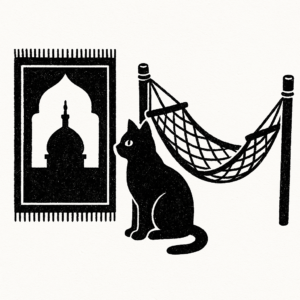
The Myth of the Beginning
Once upon a time, in a self-aware corner of Germany — where people do shadow work before breakfast and ask their friends’ pronouns mid-fight — lived two very unavailable people: Nawrass, who came from a traditional, conservative, deeply violent family, and Farhan, raised in a religious household where feelings were avoided like carbs during Ramadan.
They met, bonded over shared damage, eye contact, and the fantasy of being less broken together. So, obviously, they adopted a cat. Her name was Yabraq. No one really remembers why. It sounded ancient, poetic, ironic — or maybe it was the only name they didn’t argue about.
But one thing was clear: Yabraq was never just a cat. She was the quiet, furry bystander to a collision of worldviews, unresolved trauma, and spiritual ego. The unwanted therapist. The witness. The victim of two worldviews. No pressure, baby.
Domestic Utopia, But Make It Cringe
At first, everything looked ideal from the outside. Farhan lit candles and quoted Rumi like scripture. Nawrass painted revolutionary metaphors across the apartment walls and posted captions like “our love is resistance.” They called it their “post-religious domestic utopia.” Which mostly meant: We’re still haunted, but now we do it with good lighting and vintage rugs. And in the middle of it all, Yabraq, the unsuspecting cat, stepped delicately through sage smoke and unprocessed resentment.
The Breakup (and Narrative Acrobatics)
Of course, it fell apart. Eventually, the silence between them got louder than any fight. Their shared values forked. The fridge became a battlefield. They stopped sleeping in the same bed, and even worse — stopped sharing memes.
Then, the moment:
Nawrass: “Farhan left us.” Farhan: “Nawrass literally asked me to leave. Calmly. Like a mindfulness coach firing a client.”
What really happened? Farhan had to leave, because staying would’ve meant slowly imploding under the weight of unspoken expectations. And Nawrass needed him gone — but couldn’t handle what that looked like in the mirror. But the real heartbreak? Yabraq.
Farhan didn’t mourn Nawrass as much as he mourned the daily ritual of being judged silently by a black cat while overexplaining his dreams.
The Return of God and the Cat Conversion Campaign

Post-breakup, Nawrass went full spiritual rebirth mode. Out with the queer theory. In with Qur’an playlists. Out with memes about healing. In with Hadith reflections. And who better to start this new chapter with than Yabraq?
Nawrass lit incense, played Qur’an, and sat cross-legged in front of the cat like she was a tiny soul waiting to be saved. “You don’t have to understand, habibti… just feel it. God is love.”
Yabraq, mid-licking her butt, blinked slowly. Then came the hijab. Yes, they bought her a tiny hijab. For the aesthetic. She’s never forgiven them.
Farhan, the Hammock, and the Voice Notes
Farhan, meanwhile, was deep in trauma therapy. He journaled, bought vegan cat treats, wrote notes like “emotion = surveillance = divinity?”
He returned to Yabraq like a pilgrim. Whispered to her, “You are more than a metaphor. You are valid.” They began co-parenting. Badly.
Nawrass brought books about the Hereafter. Farhan brought hammocks and puzzle feeders. They both projected. They both blamed the other for projecting.
And Yabraq? She just accepted the situation. She was now both:
- The spiritually grounded cat in Nawrass’ Instagram stories,
- The emotionally liberated cat in Farhan’s overlong voice notes to his therapist.
Because Farhan wanted Yabraq to be free. Nawrass wanted her to be safe. So she became both.
The Eid Incident (Peak Projection)
One Eid, it hit a climax.
Nawrass gifted Yabraq a custom prayer rug with her name embroidered in Arabic. Farhan brought a hemp hammock and whispered, “It’s for decompressing from intergenerational trauma.”
Yabraq sat between them like a child of divorced philosophers. She sniffed the rug. Peed on it. Then curled into the hammock. No further comments.
Yabraq Knows Everything

People say cats don’t care. That they’re cold. Unattached. But Yabraq? Yabraq knew everything. She knew Farhan intellectualized his feelings until they disappeared. She knew Nawrass needed control to feel safe, even when it hurt others. And still, she loved them. In her own way. Through silence. Through proximity. Through selective cuddles and strategic distance. She didn’t pick sides. She outlived them both — emotionally, spiritually, and ideologically.
Legacy of the Cat With Boundaries
Years passed.
Nawrass kept praying. Farhan kept talking about boundaries. And Yabraq?
She slept. On prayer mats. On trauma worksheets. On a hoodie she claimed as her own. She was still the child of two ideologies who both tried to define her. But she’d found her own truth: That safety and freedom can co-exist — That healing doesn’t always look like hashtags — And that sometimes, the wisest, most holy, most subversive thing you can do is simply: Pee on the prayer rug and nap in the hammock.